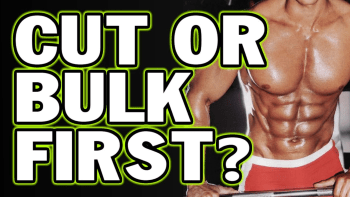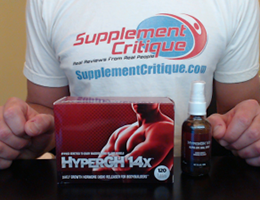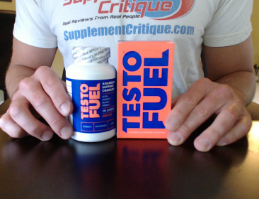Should I Bulk First Then Cut Or The Other Way Around?
By: Rob Miller
 Looking to pack on some lean muscle mass? Generally speaking, there are two different ways that you can go about doing this and many are confused as to the best approach.
Looking to pack on some lean muscle mass? Generally speaking, there are two different ways that you can go about doing this and many are confused as to the best approach.
You already likely know that your diet will mean the difference between maintaining your body weight and gaining weight, so that is where the primary changes need to occur. But, how should you best structure your diet for optimal success?
Let’s go over the two main strategies, the pros and cons of each and then give you some ideas on how to implement which one you choose.
The Bulk And Cut Strategy
The first method is to simply eat everything you can in effort to optimize muscle gain. Basically, the more you eat, the more you gain – simple as that. But, it must be remembered that there is a limit as to how much total muscle mass your body can gain each day. Once that point is hit, the rest will be converted into body fat.
Those who use this strategy don’t get hung up on this fact however as they know they are maximizing muscle building in the process. As such, once they’ve developed a level of muscle they’re happy with, they simply move on to a cutting period, where they diet down, shedding any extra fat they’ve gained.
So what are the pros and cons to this approach?
Pros:
- Allows for a restriction free period during the bulking phase
- Energy will be an all-time high with so much food coming in
- Maximizes muscle development
- May optimize strength development due to sheer caloric intake
- Motivation might stay high thanks to faster mass gains
Cons:
- Bulking and cutting cycles can be hard on the body over time
- Muscle mass loss can be high during the cutting cycle, reducing the overall progress seen
- Dieting can be quite uncomfortable and unpleasant when a great deal of body fat is gained
- Insulin sensitivity may decrease, making it harder to lose excess body fat
- May foster unhealthy food choices, which can set you up for disease over the long term
Implementing This Into Your Plan
To use this protocol, you simply eat as much food as you can take in during the muscle gain period – trying to stick to healthy choices as often as possible.
Some may work out their macros and try and hit a target calorie intake, but the energy intake is kept very high to maximize muscle gain.
Then when it’s time to cut, any one of the many fat loss diets can be utilized.
Now let’s look at the workouts involved in such an approach.
The Bulk/Cut Cycle Workout
When moving into a bulking phase, you’re going to have no shortage of food. This means both energy and recovery rates will be at an all time high. This in turn means that you can support numerous workouts per week without a problem.
This goes hand in hand with building as much lean muscle mass as possible. To support this goal, you’ll want to aim for a body part split type of workout, hitting the gym 4-5 times per week.
To this, you might add in 1-2 low intensity cardio workouts for about 20 minutes. The point here is not to burn fat but rather, to simply keep your cardiovascular fitness levels up so you can have effective strength training sessions.
In the weight room, you’ll want to be doing a mixture of compound along with isolation based movements to fully hit every muscle fiber in your body.
Let’s show you what a sample workout might look like.
Monday: Chest
Bench Press – 4 sets of 6-8 reps
Incline Bench Press – 3 sets of 8-10 reps
Chest Fly’s – 4 sets of 10-12 reps
Chest Dips – 3 sets of 10-12 reps
Push-Ups – 2 sets until failure
Tuesday: Legs
Squats – 4 sets of 6 reps
Leg press – 3 sets of 8 reps
Lunges – 3 sets of 10-12 reps
Leg Extension – 3 sets of 12-15 reps
Hamstring Curl – 3 sets of 12-15 reps
Standing Calf Raises – 4 sets of 15-20 reps
Seated Calf Raises – 4 sets of 8-10 reps
Wednesday: Shoulders
Barbell Shoulder Press – 4 sets of 8-10 reps
Upright Rows – 3 sets of 8-10 reps
Lateral Raises – 4 sets of 10-12 reps
Front Raises – 4 sets of 10-12 reps
Reverse Fly’s – 4 sets of 10-12 reps
Thursday: Off/Rest
Friday: Back
Romanian Deadlifts – 4 sets of 5-6 reps
Bent Over Rows – 4 sets of 6-8 reps
Pull-Ups (weighted if necessary) – 4 sets of 8-10 reps
V-Handle Seated Rows – 3 sets of 10-12 reps
Narrow Grip Pull-Downs – 3 sets of 10-12 reps
Saturday: Arms/Abs + Light cardio – 20 minutes at RPE 5-7 on a scale of 1-10
* Click Here
to see what RPE means.
Barbell Curls – 3 sets of 8-10 reps
Overhead Tricep Extension – 3 sets of 8-10 reps
EZ Bar Curls – 3 sets of 10-12 reps
Rope Tricep Press-Downs – 3 sets of 10-12 reps
DB Hammer Curls – 3 sets of 15 reps
Triangle Push-Ups – 3 sets until fatigue
Lying Leg Raises – 5 sets of 10 reps
Crunches On A Ball – 3 sets of 15 reps
Prone Ball Roll-In – 3 sets of 15 reps
Plank Hold – 3 sets of 30-60 second hold
Sunday: Off/rest
As you can see, the volume is high, intensity is high, and the rep ranges are varied to allow for maximum strength and hypertrophy.
When you then move into a cutting phase, your workouts will take a completely different turn. Now, since you’ll have far fewer calories coming in, the top priority is to preserve lean muscle mass tissue. So a low volume program utilizing compound lifts to maximize strength output will be key.
Cardio will likely be added in 1-3 times per week (depending on recovery ability) providing 1-2 days for rest and recovery.
Here’s what your routine may look like.
Monday: Full Body
Squats – 3 sets of 6 reps
Bench Press – 3 sets of 6-8 reps
Leg Press – 2 sets of 8 reps
Shoulder Press – 2 sets of 8-10 reps
Bent Over Rows – 3 sets of 6-8 reps
Pull-Downs – 3 sets of 6-8 reps
Tuesday: HIIT Cardio Training
5 minute at RPE 5
30 seconds RPE 9-10
60 seconds RPE 4-5
x 12
5 minute at RPE 5
Wednesday: Upper Body
Romanian Deadlifts – 3 sets of 5-6 reps
Bench Press – 3 sets of 6-8 reps
Shoulder Press – 3 sets of 8-10 reps
Pull-Ups – 3 sets of 8-10 reps
Bicep Curls – 2 sets of 10-12 reps
Tricep Extensions – 2 sets of 10-12 reps
Thursday: Off/Recovery
Friday: Lower Body
Squats – 3 sets of 5-6 reps
Leg Press – 3 sets of 8-10 reps
Lunges – 3 sets of 8-10 reps
Leg Extension – 2 sets of 10-12 reps
Hamstring Curl – 2 sets of 10-12 reps
Seated Calf Raise – 2 sets of 8-10 reps
Standing Calf Raise – 1 set of 15 reps
Saturday: HIIT
5 minute at RPE 5
45 seconds RPE 8-9
45 seconds RPE 4-5
x 8
5 minute at RPE 5
Sunday: Off/Recovery
The volume is kept far more conservative during this approach and the number of days strength training is also reduced. You will still hit each muscle group twice per week however to maintain maximum muscle retention.
A Quick Note On Supplementation
Obviously to get the best results from your training, you should think about adding on some supplementation to help with growth and recovery.
Supplements wise, I would recommend using the Crazy Mass Bulking Stack during the bulking stage, take a week off, then do a 4 week cycle with the Crazy Mass Cutting Stack.
You can read reviews of each of these products at the following links:
Crazy Mass Bulking Stack – https://www.supplementcritique.com/crazy-mass-bulking-stack-review/
Crazy Mass Cutting Stack – https://www.supplementcritique.com/crazy-mass-cutting-stack-review/
OR, just go ahead and order the supplements below:
Bulking Stack – www.CrazyMass.com/Bulking-Stack/
Cutting Stack – www.CrazyMass.com/Cutting-Stack/
Now let’s talk about the lean bulk.
The Lean Bulk
The second option is to do a lean bulk. With this option, fat gain during the bulking phase is minimized through careful calorie and food intake manipulation. Those who go this route are often more concerned with looking lean year-round, thus they approach muscle building slightly slower to prevent any fat gain.
Calories are still added to their diet to put them in an overall surplus state (to foster the muscle growth), however the degree of surplus is much smaller than in the bulk/cut approach discussed above.
This eliminates the need to cut entirely in many cases.
What are the pros and cons to this approach?
Pros:
- Keeps you looking better all year round
- May help improve insulin sensitivity, leading to greater lean mass gains
- Is the healthier approach on your body since there is no weight cycling
- Won’t have to endure an uncomfortable cutting period
Cons:
- Will produce slower results
- May be harder to stay motivated since changes occur so slowly
- Requires much more intricate food planning
- Won’t have as much food freedom as those on the bulk/cut approach
Implementing This Into Your Plan
If you’ve decided that a clean bulk is the route you want to go, there are many different protocols that can be used.
Intermittent Fasting
First is intermittent fasting. Using this approach, you typically fast all throughout the day, placing an ‘eating window’ lasting around 8 hours starting just before your workout session and in the hours that follow. By loading your calories during this time, you help encourage nutrient shuttling towards the muscle tissues, rather than sending them towards body fat stores.
On days you don’t workout, calorie intake is kept lower at maintenance levels.
You may want to consider adding a supplement called Instant Knockout into the mix here. It will help DRAMATICALLY with hunger cravings, boost your metabolism, as well as help fuel energy levels for the workout portion of your training.
Click Here to read my review of Instant Knockout.
Visit the official Instant Knockout site here: www.InstantKnockout.com
Carb Cycling
The next approach is the basic carb cycling approach. With this approach, you set your daily calorie intake on training days much higher to support extra muscle growth. Carbs are higher, fat is typically brought down, and calories are at their highest point as well.
Then on non-training days, calories are brought lower, carbs are taken down, and fats are increased slightly to control hunger.
This allows you to prevent any fat gain, while optimizing muscle gains on those training days. Some may even take their calorie intake into a slight deficit on non-workout days, promoting fat burning.
Using this strategy, your hope is to not only build lean muscle, but also burn fat at the same time.
Short Term Bulk/Cut Cycles
Finally, a last way to do a lean bulk is to simply do very short term bulk and cut cycles. So basically, you might eat in a higher calorie surplus (being sure to choose only clean foods however) for a 2-3 week period.
Then once that period was up, you would reduce your calorie intake to slightly below maintenance for one week to shed any fat that was gained.
By doing shorter cycles like this (rather than the usual 3-4 month bulk/cut cycles in the first approach), you help minimize total body fat accumulation.
As soon as you see it starting to come on, you simply revert to a brief cutting period, losing the fat before you start up once again.
Let’s now look at how the workout set-up would be on this approach, assuming you are using a carb cycling protocol, placing more calories on your training days.
Lean Bulk Workout
If doing the lean bulk approach, you’ll be in the middle ground. You’ll have enough fuel coming in to do intense workout sessions, but on days off, your calorie intake is lower to avoid fat gain. This hampers recovery slightly, so volume must come down.
This workout will be all about maximizing nutrient partitioning to the muscle cells, keeping you as lean as possible. This means using compound lifts as well as adding supersets into the protocol to boost the metabolic rate. This combination will still allow you to sustain maximum strength and power development, while burning excess body fat.
One session of HIIT is also added per week to augment total fat burning.
Here’s what your workout routine would look like.
Monday: Lower Body
Squats – 4 sets of 5 reps
Leg Press – 3 sets of 8-10 reps
Lunges – 3 sets of 8-10 reps
Superset:
Leg Extension with Hamstring Curl – 4 sets of 10-12 reps
Superset:
Seated Calf Raise with Hanging Leg Raise – 3 sets of 10 reps
Superset:
Standing Calf Raise With Plank Hold – 3 sets of 8 reps/30-60 second hold
Tuesday: Upper Body
Bench Press – 3 sets of 6 reps
Barbell Rows – 3 sets of 6 reps
Shoulder Press – 3 sets of 8 reps
Pull-Downs – 3 sets of 8 reps
Superset:
Bicep Curl with Tricep Extension – 3 sets of 12-15 reps
Superset:
Lateral Raise with Front Raise – 3 sets of 12-15 reps
Wednesday: HIIT
5 minutes at RPE 5
30 seconds at RPE 9-10
60 seconds at RPE 4-5
x 10
5 minutes at RPE 5
Thursday: Off/Recovery
Friday: Lower Body
Deadlifts – 4 sets of 5 reps
Split Squats – 3 sets of 8-10 reps
Step Ups – 3 Sets of 8-10 reps
Superset:
Dumbbell Sumo Squats with Leg Extension – 3 sets of 8-10 reps
Superset:
Hamstring Curl with Walking Lunges – 3 sets of 8-10 reps
Seated Calf Raise – 3 sets of 10 reps
Saturday: Upper Body
Incline Bench Press – 3 sets of 8 reps
Bent Over Rows – 3 sets of 8 reps
Superset:
Chest Fly’s with Reverse Fly’s – 3 sets of 10-12 reps
Superset:
Bicep Curls With Reverse Grip Pull-Ups – 3 sets of 10-12 reps
Superset:
Tricep Extension with Lateral Raise – 3 sets of 10-12 reps
Sunday: Off/Recovery
When structuring this program, be sure to increase your calorie intake on weight training days and then decrease your intake on off or cardio only days to promote optimally leanness.
So Which One Is Right For Me?
So there you have a closer look at some of the lean bulk strategies that can be used. As you can see, your workout will vary depending on the overall approach you choose to use. It’s always critical that you match your workout with your nutrition intake as the two really will go hand in hand to yield the results that you are looking for from your training protocol.
Keep in mind there is not a right or wrong approach here, but rather, one that’s best for you. Either one WILL work, it’s just a matter of personal preference.
While most people will feel healthier and better about themselves doing a lean bulk, some simply lose focus and motivation as changes aren’t happening fast enough. In those cases, the former approach might be the better option.
What Is RPE?
RPE stands for Rating of Perceived Exertion.
It’s essentially a way of self-diagnosing physical activity intensity level, and is based on how hard you feel your body is working.
From the example we used earlier, your RPE would look something like this:
1 – No exertion at all.
2 – Extremely light exertion.
3 – Very light exertion.
4 – Light exertion.
5 – Somewhat Hard exertion.
6 – Hard exertion
6 – Heavy exertion.
7 – Very hard exertion.
8 – Extremely hard exertion
9 – Really, Really, Hard
10 – Maximal exertion.
Top 3 Body BuildingAffiliate Disclosure
HyperGH 14X is a potent HGH releaser which works great for bodybuilding. Read more in our review.
Testofuel is the most effective testosterone boosting supplement on the market that ive tested. Read my review to learn more.
Ostarine is the poster boy for SARMS, and will promote lean muscle tissue growth dramatically.








i am a 43 year old with fibromyalgia in my arms. so to much just makes me hurt more.
what do you recommend for me? i have been eatting really healthy. but my stomach is a 18 wheeler tire 🙂 that is where all my weight is.
any suggestions i would love to hear.
thank you,
denise
Sounds like you would benefit from a supplement called Phen 375. It’s a highly potent appetite suppressant and fat burner that will help you shed those excess pounds, here’s my review: https://www.supplementcritique.com/phen-375-review/
My immediate goal is to lose weight. I moved back up to New England from Florida and put on about 65 unwanted pounds.
I am 48 yrs old and haven’t been in the gym in years. Previously to that I was a gym rat and in awesome shape.
Now I have a lot of work to do. My thoughts were to use the 2 cutting stacks, get back into gym routine and drop the weight.
Then move on to the bulking stack and take it from there. I assume since I’ve gone from Beast to Fat boy, after I lose this weight, about 60 – 65 lbs, everything else should fall into place.
I understand my need to change my whole lifestyle: gym, diet, etc.
My question: If I am strictly looking to lose weight at first, do you think starting off with the 2 cutting stacks is the right thing to do?
Thanks in advance for your help and suggestions.
Everything you’ve been sending is awesome info…..Peace
Yeah if I were you I would skip the bulking stack and go right into the cutting stack. Make sure you follow the diet and exercise routines in the ebook I sent you back in December, especially the High Intensity Interval Cardio portion.
That will allow you to shed the weight real quick. You may want to incorporate a pre workout into the mix as well. Check out a supplement called 4 Gauge. I just finished testing it and it will give you a shit ton of energy for your workouts.
Here’s my review: https://www.supplementcritique.com/4-gauge-pre-workout-review/
Hope this helps and keep me posted on your results!
In your case I would recommend you stack a fat burner called Instant Knockout with a testosterone booster called Testofuel. Both work GREAT when combined to help you reduce body weight and fat, as well as give you enhanced strength gains.
Check out my reviews below:
Instant Knockout – https://www.supplementcritique.com/instant-knockout-fat-burner-review/
Testofuel – https://www.supplementcritique.com/my-personal-testo-fuel-review-and-results
Also, for your convenience I’m sending you my free “How To Get Ripped Quickly” eBook. It’s packed with tons of tips on diet and exercise that will help you with your goals.
Thank you
Glad to help. Keep up the great work!
Thank you for reply.
As for testosterone boosters, check out a supplement called Prime Male. I’ve recommend it to probably HUNDREDS of guys your age, and they’ve all gotten great results. Here’s my review: https://www.supplementcritique.com/prime-male-testosterone-booster-review/
Yeah your total testosterone levels are actually really good, albeit a little lower than the average based on this chart. What were your free testosterone levels if you don’t mind me asking?
I have decided on TBAL75,WINIDROL and CLENBUTROL. PLEASE give me your honest opinion.
I would like to get to 170. Are those the best 3 cutting supplements for starters or would you use any/all different supplements.
Also will the DHT or the DHEA cause acne or hair loss
I would go with the Cutting Stack. You’ll get 4 supplements for the same price that you’d be paying for the three you mentioned. And it includes the Testosterone Max, which is important to your goals, any goals involving increased muscle mass and tone, really.
Rob
SupplementCritique.com